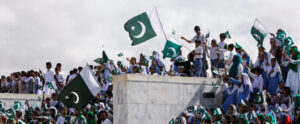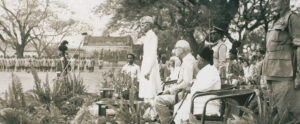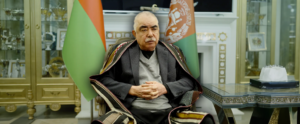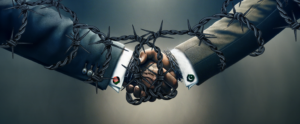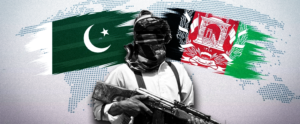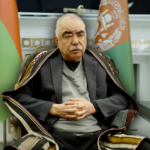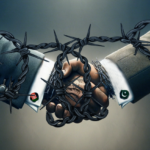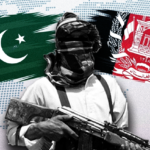S. Iftikhar Murshed & S. Mikail Murshed
(This paper is from the Oct/Dec 2015 issue of Criterion Quarterly)
Abstract
(The sordid history of Afghanistan is one of unbroken violence. It is a story of superpower stupidity, compounded by the hare-brained ‘strategic’ ambitions of neighboring states and the insatiable lust for power of the local warlords. From another perspective, it has always been the quest for national unity in a heterogeneous population that has defined the Afghanistan problem. The urge for unity was absent from Afghan society because one group, the Pashtuns, imposed itself on the others. Thus uni-ethnic rule in a multi-ethnic society and its attendant backlash unleashed violence among a people, who had never wanted to be united into a single nation. Foreign invasion of the country added a new dimension to the bloodletting and ensured that durable peace would remain as illusive as a mirage in the desert. Author).
I
The backdrop of the Afghan tragedy
The story of Afghanistan is one of superpower stupidity accompanied by the hare-brained ‘strategic’ ambitions of the neighbouring states – particularly Pakistan and Iran – and the insatiable lust for power of the local warlords. These three factors have, singly and collectively, defined Afghan ground realities. As a consequence, peace has eluded the country for almost four decades.
From another perspective, it has always been the quest for national unity in a heterogeneous population that has defined the Afghanistan problem. The difficulties are compounded because the disparate ethnic groups which include the Pashtuns (42 percent), the Tajiks (27 per cent), Hazaras (9 percent), Uzbeks (9 percent), Aimaks1 (4 percent), Turkmen (3 per cent) and other small groups were brought together through the centuries, more by accident than any shared desire to live together.
The urge for unity was absent from Afghan society because one group, the Pashtuns, imposed itself on the others. The ethnic minorities were subjugated and treated as second-class citizens. The Pashtuns monopolised economic and political power with the encouragement of imperial Britain in the nineteenth and early twentieth centuries. Thus uni-ethnic rule in a multi-ethnic society and its attendant backlash unleashed violence among a people, who had never wanted to be united into a single nation.2 Foreign invasion of the country added a new dimension to the bloodletting and ensured that durable peace would remain as illusive as a mirage in the desert.
On 27 December 1979 the former Soviet Union invaded Afghanistan with an initial 85,000 troops. This triggered a fierce freedom struggle that lasted almost a decade and culminated in the humiliating withdrawal of the occupation forces in accordance with the stipulations of the Geneva Accords of 14 April 1988. The fatal flaw in the proximity talks in Geneva between the Pakistan government and the Soviet-installed Kabul regime was that the Afghan resistance were not invited.
The agreements that eventually emerged from the protracted negotiations, with the United States and the Soviet Union serving as guarantors, consisted of multiple instruments. These included: (i) a bilateral compact between Pakistan and Afghanistan on the principles of mutual relations, in particular non-intervention and non-interference; (ii) a declaration on international guarantees, signed by the USSR and the USA; (iii) an accord between Islamabad and Kabul on the voluntary return of the Afghan refugees; (iv) an agreement on the interrelationships for the settlement of the situation relating to Afghanistan, signed by Pakistan and Afghanistan and witnessed by the Soviet Union and the United States; and, (v) a timetable for the withdrawal of Soviet troops which commenced on 15 May 1988 and was completed on 15 February 1989.
The last Soviet soldier to leave was Lt Gen Boris Gromov, the commander of the 40th Army in Afghanistan. Gromov always had and still has a flair for dramatics. He hopped off his armoured personnel carrier and strode calmly across the Friendship Bridge that spans the River Oxus (Amu Darya) into what was then Soviet Uzbekistan.
Despite the bravado, the phased withdrawal of the occupation forces had been anything but smooth. On one occasion, the Soviet ambassador in Islamabad stormed into the foreign office yelling: “Fighters belonging to Gulbadin Hikmatyar’s3 Hizb-e-Islami4 have invaded my country. Stop them before we retaliate.”
Hikmatyar was immediately summoned to the foreign office where he admitted sheepishly that his men had indeed entered Soviet territory. He explained that this was intended as warning to Moscow never again to set foot on Afghan soil and then added: “Tell those kafirs (infidels) not to dance, sing, and drink vodka as they leave Afghanistan or else we will make mince meat of them. They should go quietly with their heads bowed in shame for what they have done to my country.”
Several years later, Gromov entered politics and was re-elected governor of the Moscow region in 2003. Soon afterwards at a lunch, he introduced himself to Pakistan’s ambassador in Russia saying: “Welcome to my country, dushman (enemy). I am only joking, we know that you are an expert on Afghanistan and we would like to hear your views on how peace can be restored in that country.”
The Afghan resistance, or mujahideen, were neither a party to the negotiations nor to the Geneva accords and therefore refused the terms of the settlement. They had fought heroically and defeated a superpower. But they did not celebrate their triumph. There was no jubilation, and, the nationalist upsurge that accompanies a successful war of liberation was absent from Afghanistan. This is because the freedom struggle had been a decentralised conflict, fought in many theatres of war through the length and breadth of approximately 647,000 square kilometres of rugged Afghan territory. There was no central figure around whom the people could rally.5
Local commanders, who had fought against the Soviet occupation army, established themselves in their respective areas. Peace therefore did not return to the country. The conflict that followed transformed itself from a heroic war of liberation to an ugly contest for power. The rule of president Burhanuddin Rabbani6 from 1992 to 1996 was particularly disastrous. The government’s writ was confined to Kabul and a few cities. The rest of the country was at the mercy of local warlords. The chaos spurred the emergence of the Taliban.
II
The rise of the Taliban
In the last week of August 1994 when Mullah Omar7 set forth with 45 men from a madressah (seminary) in Maiwand, Kandahar, to punish a warlord who had molested a local family, he unwittingly set in motion the Taliban movement that propelled him to dazzling heights. Soon all of Afghanistan south of the Hindu Kush came under the control of the fanatical clerics from Kandahar.
Local warlords had created fiefdoms owing nominal loyalty to one political leader or the other, but imposing in fact their own arbitrary fiat in the areas that they controlled. In Kandahar, the main road to Herat on the one hand and to Chamman in Pakistan on the other, had toll posts and barriers at virtually every kilometre, where local commanders exacted ‘fees’ and whatever other extortions they decided upon on any passing traffic. The lives and honour of ordinary citizens were at their mercy.
What is not widely known is that initially even Burhanuddin Rabbani, who was killed in a suicide bomb attack at his home in Kabul on his 71st birthday on 20 September 2011, sought to use the Taliban to eliminate his opponents and to quell the unrest that had been generated by his failure to abide by the Islamabad Accord8 of 7 March 1993 under which he came to power. He offered them assistance and there is sufficient evidence to show that his emissaries frequently contacted the Taliban to offer financial and other support.
In the May 1995 issue of the Afghan News, published by Rabbani’s Jamiat-e-Islami9 he is quoted as saying: “The Taliban, and some mujahideen from Kandahar asked us to help them to open roads and improve law and order in their province. We supported them.” This was an outrageously ridiculous claim because the Taliban movement had, by that time grown from strength to strength and posed a formidable threat to the Kabul regime itself.
Furthermore, the Taliban did not need such assistance. The local commanders who surrendered brought with them substantial quantities of weapons and ammunition. With each success the ranks of the Taliban swelled with veterans who had fought against the Soviets. By late October 1994, the Taliban movement gained victories one after another in the fight against the warlords and, within a short time, captured the whole province of Kandahar, from where they spread their influence to other parts of the country.
In April 1996 alone the Taliban fired 866 rockets on Kabul killing 180 civilians and injuring an estimated 550. Their onslaught resulted in the fall of Jalalabad with less than 20 casualties. In Sarobi, where Rabbani and Ahmed Shah Masood10 had sent their own commander to strengthen its defence and mine the approaches, the local Ahmadzai tribe joined the Taliban, and the commanders around Sarobi either surrendered immediately or fled to Kabul.
It was claimed that Kabul could sustain a siege for at least a year, but it fell to the Taliban virtually overnight on 27 September 1996, with only 200 casualties. Immediately after entering the Afghan capital, the triumphant clerics went straight to the UN office where the former president, Muhammad Najibullah,11 had taken refuge. He was mercilessly killed and his body was hung for several days at the city centre.
This was the curtain raiser to the Taliban rule in Afghanistan from 1996 to 2001.
With the capture of Kabul by the Taliban, the Rabbani regime retreated north of the Hindu Kush. The immediate outcome of this was the formation of the Shura-e-Aali-e-Difa-e-Afghanistan – the Supreme Council for the Defence of Afghanistan – more commonly known as the Northern Alliance. This was a coalition of unlikely bedfellows consisting of minority ethnic groups who, despite their hatred of each other, were united by their fear of the Pashtun-dominated Taliban. Afghan society thus became dangerously polarised along ethnic fault-lines.
On 4 December 1996, a parallel government was set up in Mazar-e-Sharif by the Northern Alliance. Though it consisted of many parties, the alliance was dominated by three elements which, in descending order of importance at the time, included the powerful ethnic Uzbek warlord Abdul Rashid Dostum’s12 Jumbish-e-Milli, the Tajik Jamiat-e-Islami led by Burhanuddin Rabbani, and the Shia Hizb-e-Wahdat13 headed by Karim Khalili.
Mullah Omar’s meteoric rise and the stunning success of the Taliban were neither inspired by ideology nor by religious fervour. It was the prevailing anarchy and chaos that made the demoralised populace welcome any force that could liberate them from the stranglehold of brigands and extortionist warlords. They longed for security and an honest administration, no matter how harsh its system of justice.
The rule of the Taliban did bring security but it was the security of a prison. It was claimed that the sharia (Islamic law) had been imposed, but many of the laws that were ruthlessly enforced were remote from Islamic tenets. The administration, however, was relatively honest inasmuch as the Taliban were a volunteer movement and none of its members – down from Mullah Omar to provincial governors, ministers and its fighters – received any pay.
The initial reaction of ordinary Afghans was one of relief. Crime had disappeared from the streets. There was no longer any theft, murder or molestation of women and young boys. The most conspicuous, perhaps the only achievement of the Taliban, was the deweaponisation of the 75 per cent of Afghan territory controlled by them.
Like all megalomaniacs, particularly those who believe that their mission is God-inspired, Mullah Omar took pride in never changing his mind. The decisions of the amir-ul-momineen (the commander of the faithful), the fanciful title that was conferred in 1996 on Mullah Omar by the Afghan Taliban, were not to be questioned and were as immutable as the mountains and blood-drenched plains of Afghanistan.
This not only had disastrous consequences for the country but also foreshadowed the dramatic events of 9/11. Since then terrorism has emerged as the single biggest threat to global peace and stability.
Unknown to the rest of the world, it was in Taliban-controlled Afghanistan that the 9/11 attacks on the US were meticulously planned. This is detailed in an open letter to Osama bin Laden ten months before he was killed by US special forces in Abbottabad from his former associate and friend, Abu Muhammad Al-Libbi Noman Benotman. Bin Laden was bluntly reminded: “Separately, when Mullah Omar asked you on several occasions to stop provoking and inviting American attacks on his country, you ignored him. How can you claim to fight for an ‘Islamic state’ and then so flagrantly disobey the ruler you helped put in place?”
It is uncertain whether Mullah Omar was aware of the Al-Qaeda chief’s intentions. If he had been taken into confidence even partially, then the logical assumption is that it was with his tacit approval that the blueprint for the coordinated terrorist attacks on the US was being rapidly finalised. The Al-Libbi letter does not provide a clear answer. It merely states that there were elements within Al-Qaeda’s inner circle that were against the 9/11 attacks being carried out without Mullah Omar’s consent: “The question asked by many, even among the closed group, was by what right did Al-Qaeda bypass and ignore Mullah Omar? And, of course, even if Mullah Omar had given his permission this would not change the fact that such attacks were completely unjustifiable.”
Despite Bin Laden’s treachery, Mullah Omar refused till the very end to revoke the asylum that had been granted to the Al-Qaeda leader. Under no circumstances was he willing to extradite the arch terrorist to a place where he could be brought to justice. A dramatic illustration of this came in the autumn of 1998 when Prince Turki Al Faisal, the Saudi intelligence chief from 1979 till 2001, visited Kandahar accompanied by Pakistan’s special envoy to Afghanistan.
Prince Turki congratulated Mullah Omar on the ground successes of the Taliban in their military operations against the Northern Alliance as they had captured Mazar-e-Sharif on 8 August that year. After these preliminaries, he said that he had come to take Osama bin Laden back with him as per Mullah Omar’s commitment three months earlier. The Taliban leader replied that he had made no such promise to which the Saudi prince responded that he had.
Prince Turki insisted that Mullah Omar should redeem his pledge on which the latter went into the courtyard and poured a bucket of cold water over his head and then returned for the talks. This absurdly dramatic behaviour had no impact on Turki who kept insisting that the cleric had promised that he would hand over Bin Laden within three months. Mullah Omar repeated with growing irritation that he had given no such undertaking and there could have been mistake by the interpreters. To this the Saudi prince arrogantly told the one-eyed leader of the Taliban that he should learn Arabic to avoid such misunderstandings.
Mullah Omar’s patience was wearing thin and he responded: “I know Arabic. You should learn Pashto. I am not a liar. If I had told you that I would give Osama bin Laden to you I would have fulfilled my promise. You are putting pressure on me at a time when the Iranians have massed thousands of troops along our borders. Let me tell you we will not be pressured. If Iran makes the mistake of attacking us, we will fight back and shortly thereafter the white flag of the Taliban will be flying in Tehran. Are you in league with Iran?”
“We are not,” replied Prince Turki. “Now hand over Bin Laden.” The supreme leader of the Taliban could no longer contain his anger and screamed: “You are a hypocrite, your king is a hypocrite and so are your ulema. God has given you everything but yet you cannot defend yourselves against puny Iraq and therefore you invited the Americans into your country to protect you and to fight your battles. Learn from us how to fight. If you are scared of Iraq then let us defend you.”
This was too much for Prince Turki. He stormed out of the meeting along with the Pakistani envoy and headed for the Kandahar airport to fly back to Islamabad. Shortly afterwards, Saudi Arabia withdrew its diplomats from Kabul and relations between the Taliban and Riyadh remained strained.
Mullah Omar’s stubborn refusal to extradite Osama bin Laden to a place where he could be brought to justice led to the fateful events of 11 September 2001. Within weeks the horrific rule of the Taliban came to an abrupt end. Afghan experts are probably not even aware that on 6 September 1999 – two years before 9/11 – Mullah Omar wrote to President Bill Clinton.
The letter is reproduced verbatim because its contents reflect the mind-set of the Taliban and is of particular relevance for the hitherto futile quest for the restoration of durable peace in Afghanistan:
“Excellency,
Please accept our greetings and well wishes.
I want to express my view regarding your attitude towards the Islamic Emirate of Afghanistan. I would like to say that whatever you do and whosever enemy you become, please do not become an enemy of Islam. When you say that the Taliban are fundamentalists or they are strict Muslims and that is why you are against them, it means you are against Islam, although you may say you that you do not have any animosity towards Islam. If you look at the history of thousands of years, anyone who became an enemy of Islam has gained nothing instead of harming himself. Whatever we are – even if we are as you say fundamentalists – we are far away from you and we do not intend to harm you and cannot harm you either.
“Ours and your Almighty God has obligated us to serve our religion. We are not mad and nor are we in love with power. We are in the service of God and that is why we are strict in our position. If you have any objection to anything we do, you should look at our deeds in the light of Islam (whether they are according to Islamic principles) and if they are in accordance with Islam – you should know that is why we have to follow this path, how could we change it? Please be a little fair.
“Much is going on in the world. And it is possible that your strict position regarding us might be flawed. So let me bring another point to your attention and it is this: if we were overthrown, there would be major chaos and confusion in the country and everyone including every single oppressed individual would blame you for it.
“Furthermore, if we are overthrown, Afghanistan would be used by Iran. And Iran is such a harmful terrorist nation that there is no nation like it in the world. As it is, despite what you think, even now we have posed no problem for you as has Iran. So, if despite these clarifications, you still say that we are to be blamed and you consider that you are right, what can we say except that God alone knows who is really to be blamed and may God punish the guilty with storms and earthquakes.”
This was the only letter ever written by Mullah Omar to a foreign head of state. It demonstrates that the increasing US pressure on the Taliban over their links with international terrorism, and, in particular the asylum given to Osama bin Laden was making the leadership in Kandahar nervous. But even then this had no impact on the determination of Mullah Omar never to extradite the Al-Qaeda chief. Similarly, his hatred of Iran remained till the very end.
All statements and the few letters written by the Taliban were spontaneous and often ill-thought-out reactions to events. An example of this was Mullah Omar’s hysterical outburst at his meeting with the Saudi intelligence chief and the statement that the Taliban flag would be hoisted in Tehran should Iranian troops cross into Afghanistan.
On another occasion, the Taliban minister of culture and information Mullah Amir Khan Muttaqi gave an unbelievably stupid assurance to the Uzbek foreign minister, Abdul Aziz Kamilov after the Tashkent Six Plus Two meeting on 20-21 July 1999 that he would try to persuade Turkmenistan to sign the conference declaration which in fact was weighted heavily against the Taliban.
Muttaqi and his delegation were received by the dictatorial president of Uzbekistan, Islam Karimov, who thus became the first head of state, other than that of Pakistan, to invite the Taliban to his country and then have an exclusive meeting with them. He was told by Muttaqi that the Taliban government wanted to establish the best of relations with all its neighbours so that the entire region could prosper. This was appreciated by Karimov who also gave the assurance that his country would resume power supplies to northern Afghanistan and also broaden cooperation between the two countries.
Pakistan’s special envoy for Afghanistan also met the Karimov. Foreign minister Kamilov was present on the occasion and kept nodding his head to every sentence uttered by his president when unexpectedly Karimov told the Pakistani envoy: “Mr Ambassador, my foreign minister knows nothing about diplomacy why don’t you give him a few lessons on the intricacies of interstate relations.” The unfortunate Kamilov, who had turned red in the face dutifully nodded again. The embarrassed envoy replied: “Mr President I’ve met foreign minister Kamilov on several occasions and I have always admired his acumen and diplomatic skills.”
The Six Plus Two mechanism was the brainchild of Pakistan’s special envoy on Afghanistan and was proposed during a meeting in Moscow with the Russian deputy foreign minister on 2-5 April 1997. It was built around the concept of peace talks between the Taliban and the Northern Alliance in which the six countries with contiguous borders with Afghanistan – China, Pakistan, Iran, Turkmenistan, Uzbekistan and Tajikistan – plus the US and Russia would participate as observers. Should an agreement emerge among the Afghan parties it would be guaranteed by the Six Plus Two group.
The idea was hijacked by the UN secretary general’s special representative on Afghanistan, Lakhdar Brahimi who then proceeded to make a glorious mess of things. Brahimi, a former foreign minister of Algeria, organised scores of meetings among the ambassadors of the Six Plus Two group in far away New York. The Afghans were never invited to these useless confabulations. It was as ridiculous as an enactment of Shakespeare’s Hamlet but without the prince of Denmark.
The Tashkent meeting of the group was the only one to which the Afghan parties were invited. But even this meant nothing because there was no intra-Afghan dialogue on the occasion. The leaders of the delegations merely delivered tedious speeches that were politely heard and then forgotten. As already noted the declaration adopted at Tashkent was slanted in favour of the Northern Alliance, but this made no difference to the Taliban delegation. Either they did not understand the importance of the document or it was their way of showing utter contempt for such resolutions. For them all that mattered was the ground situation in Afghanistan. After the fall of Mazar-e-Sharif to them the previous year most of the country came under their control.
The resistance to the Taliban in northern Afghanistan was mostly confined to the Panjsher valley which was controlled by Ahmed Shah Masood, the head of the military wing of the Jamiat-e-Islami. This continued till 9 September 2001 when suicide bombers posing as journalists killed Masood. Two days later the world reeled under the shock of the Al-Qaeda attacks on the US.
III
Post-Taliban turmoil
Less than a month after the 9/11 attacks, the US began intensive aerial bombing of Taliban-controlled Afghanistan and the Northern Alliance forces were able to enter Kabul by the end of 2001. Thus ended the era of the Taliban. During their barbaric rule, Pakistan and the international community preached incessantly to them on the need for a broad-based government but what initially emerged from the Bonn Agreement (the clumsy formal title was, Agreement on Provisional Arrangements in Afghanistan Pending the Re-Establishment of Permanent Government Institutions) of 5 December 2001 was a dispensation dominated by the Tajiks and, among the Tajiks, the Panjsheri elements.
President Hamid Karzai, an ethnic Pashtun, was virtually parachuted into Kabul from allied bombers but the strongman in his regime was his Panjsheri deputy, General Mohammad Qasim Fahim14 who was conferred the honorary title of ‘Marshal’ by Karzai in 2004. Fahim continued to wield influence till his death in March 2014.
The Panjsheris who, at the best of times, controlled no more than 10 percent of Afghan territory, called the shots during the Karzai regime. The government in Kabul was as narrow-based as any dispensation could be. The majority Pashtuns, the Uzbeks and the Hazaras had little or no say in the affairs of state. Warlord zones reappeared and Afghanistan was again at the mercy of ambitious, avaricious men eager to establish their own fiefdoms.
The Taliban had deweaponized Afghan society but weapons, after their rule, were no longer in short supply. Several ministers and high government functionaries were assassinated and even Karzai’s bodyguards in the early years of his rule consisted of non-Afghans because he could not trust his own nationals, having narrowly survived two attempts on his life in 2002 and again in 2004.
The international community had rightly condemned the Taliban for the violation of human rights and particularly gender discrimination. The reaction of the US to the Taliban soon after they had taken Kabul was one of cautious support. The first formal American pronouncement on them came on 18 November 1996 during a UN conference in New York of countries with interest in Afghanistan. Three elements in the statement of the US delegate, former assistant secretary Robin Raphel (the first wife of ambassador Arnie Raphel, who died in the Bahawalpur air crash with president Ziaul Haq on 17 August 1988), were particularly interesting. She observed that the Taliban were purely an indigenous movement, that their success had little to do with military prowess (implying that they were preferred by the Afghan people to the chaos that had been prevailing), and that some of the policies pursued by the Taliban were extreme but this could be moderated by engaging with them.
This brief period of support for the Taliban changed radically by the time Madeleine Albright became US secretary of state. During her confirmation hearing in January 1997, senator Christopher Dodd said that he intended to table a resolution on the Taliban in the near future because of their “reprehensible and disgusting” treatment of women. Albright’s response was: “We are deeply troubled by what we have heard the Taliban are doing. The whole situation in Afghanistan is one that is deeply troubling. There are factions that for years have been unable to get together. What we would like to see is a unity government of some kind.” By the time Albright visited Pakistan in November 1997 she expressed her dislike of the Taliban without mincing words and described them as “despicable” while addressing Afghan women at the Nasir Bagh refugee camp in Peshawar.
The atrocities against the Afghan people by their leaders through the previous decades and centuries no longer seemed relevant to the post-Cold War world which sincerely believed in the triumph of political liberalism and the free market system. The policies of the Taliban contrasted starkly with this wave of freedom.
The Taliban were also severely criticised for narcotics production and trafficking although the problem predated their rule. In 1997, the Taliban signed an agreement with the United Nations Drug Control Programme (UNDCP) through which they undertook to reduce poppy cultivation if funds were provided for crop substitution. According to the UNDCP, narcotics production in Afghanistan more than doubled in 1998 to 4,600 tons compared with 2,100 tons in 1997. In this period there was a 43 percent increase in the area under poppy cultivation with 97 percent located in places under Taliban control. In their report the UNDCP ignored the ground reality that in 1998, almost the entire country came under the sway of the Taliban.
Under international pressure, Mullah Omar eventually issued an edict banning poppy cultivation and, according to experts, the production of the crop ended though there was no significant reduction in trafficking because of abundant poppy stockpiles. Unfortunately the international community failed to grasp the opportunity that had suddenly presented itself. Economic assistance for crop substitution was urgently needed but was never provided.
But what is no less disconcerting is that in 2004 Hamid Karzai turned down a US proposal that involved aerial spraying of herbicides to end poppy cultivation because he dared not alienate powerful warlords on whose support he depended. By 2005 Afghanistan became the world’s major source of narcotics production and trafficking for which the international community is also culpable.
Under Taliban rule most of Afghanistan was secure and stable. But there was no freedom and people lived in fear. The Bonn-generated interim government of Hamid Karzai brought relative freedom but also resulted in initial instability. Disappearances, killings and factional fighting occurred with alarming frequency. Although there is no evidence that these were state sponsored, many believed that General Fahim was responsible for some of the violence. The main cause was weak governance which is inherent in minority dominance of society.
This was further compounded because the majority Pashtun community, unlike the other ethnic groups, did not have a recognised leader. The flamboyant and erratic Hamid Karzai, though a Pashtun, was not respected in his own ethnic group and never had a mass following. This was largely because his track record had been anything but stellar, and, even worse he has always come across as political chameleon – an opportunist.
After the Soviet withdrawal from Afghanistan, Karzai became a minister in the Burhanuddin Rabbani regime, and then, in the early stages of the Taliban ascendency he threw in his lot with the Taliban. On 8 December 1996 when a delegation from Pakistan met Mullah Omar for the first time, they were told that Karzai had been appointed the Taliban representative to the UN in New York. But later, he distanced himself from the movement because he suspected that they had links with Pakistan.
Karzai’s hatred of Pakistan did not, however, deter him from living in Quetta along with his family where he received and gratefully accepted a stipend from Islamabad. In this period he actively strove for the return of ex-king Zahir Shah to Afghanistan. After the assassination of his father on 14 July 1999, that Karzai believed had been carried out by the Taliban, he vowed to avenge the murder by striving to oust them. He thus became an important element in the nebulous concept known as the ‘second Pashtun option’ that was being enthusiastically promoted in the West.
However despite the obvious shortcomings of the Bonn Agreement, it seemed to offer the best hope for the establishment of lasting peace in Afghanistan. On 22 December 2001 Karzai became the chairman of a 29-member interim administration. On 13 June 2002, a loya jirga (grand assembly) appointed him the interim president of the transitional administration, and, after the presidential election on 9 October 2004, Karzai emerged as a more credible leader. Despite allegations of widespread rigging, by winning in 21 Afghan provinces and defeating 22 of his opponents he became, in effect, the first democratically elected president of Afghanistan.
Initially the Karzai government took measures to provide employment and education opportunities to women but the dreadful hold of obscurantist tradition was the impediment. Most Afghan women still preferred to wear the burqa and only a few ventured outside the security of their homes. But it was corruption and atrocious governance that defined Karzai’s 13-year rule from December 2001 to 29 September 2014.
The writ of his government did not extend to massive swathes of territory under Taliban control. The UN-authorised US-led invasion and occupation of the country from 2001 to 2014 merely resulted in the ouster of the Taliban regime but ignited a conflict unparalleled in its barbarity even by Afghan standards. In the first six months of 2015 an estimated 5,000 civilians were killed. The violence continues unabated.
It was only during the rule of the Taliban from 1996 to 2001 that a strong central authority controlled most of Afghanistan. The stabilisation of the country could have been achieved then had the international community heeded the US statement at the UN meeting on 18 November 1996 and engaged with and not isolated the Taliban. The Afghans have always needed strong leadership and this was provided by the Taliban. This was what imperial Britain and Russia understood only too well as they played out their ‘great game,’ revolving around the empowerment of the Pashtun, in the nineteenth century.
Pakistan with the support of the major powers, particularly the US, could have played an important role in stabilising Afghanistan. Positive pressure on the Taliban was required. A strong leadership was already in place. Ethnic minorities, but not the leaders of the factions, had been included in the administration. The Taliban had appointed 11 non-Pashtun governors, some of them in Pashtun provinces, and included five members of the minority ethnic groups in the cabinet. Economic assistance would have provided job opportunities and resulted in the stabilisation of Afghan society.
If this had been done, gender discrimination could have been substantially reduced. The narcotics problem and the spectre of terrorism could have been squarely addressed. The 9/11 tragedy might not have happened and other acts of terrorist violence emanating from Afghanistan could have been averted. The opportunity was squandered.

